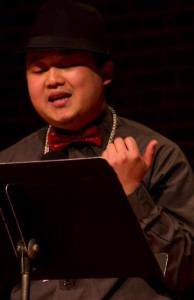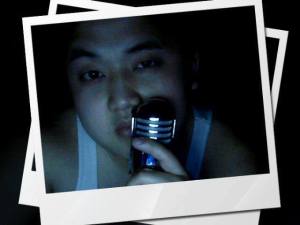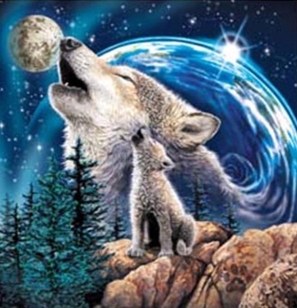
It is called the “mad dog” look; although it exists in many forms, aggravation, harassment, or observation, it’s simply “the stare.” It’s the stares that you get when you’re in unfamiliar situations or places, whether it’s explicit or all just mental, it’s all up to personal interpretation. It might just be admiration or someone may be interested in you, perhaps it is your outfit or your attractive appearance. The perspective from the other side of the spectrum is encountering someone with prejudice against you and “mad dogging,” provoking, or harassing you with their stares.
Gazing for a second too long at an insecure person with anger management issues within the peripheral of your vision can be problematic. Daydreams and wandering minds must be kept under control, because in the unlikely event that a tumbleweed starts rolling and guitar and trumpet music starts playing, mad dogging situations can turn into a standoff between the good, the bad, and the ugly like classic western cowboy duels in the movies.

You can choose your friends, but you sho’ can’t choose your family – Harper Lee, To Kill a Mockingbird – Source: fidelialam.com
In some cultures, it’s impolite to make eye contact, an inherited trait from animalistic behaviours. In other cultures, it’s a gesture of endearment and engagement; by focusing all attention to the person that you’re speaking to, you’re showing them respect. But the concept of “it’s rude to stare,” or so we were taught, discourages us from observing people with our eyes and initiating constructive conversations with our mouth and mind. So is it rude to develop observation skills? Isn’t that how prejudice and rumors fueled by incorrect implications and ignorance spread? Growing up, I have had my share of awkward stare downs. Being labeled “guilty by association” by society and being a member of such a small population, it’s like the quote in To Kill A Mockingbird, “you can choose your friends but you sho’ can’t choose your family,” it couldn’t be helped having certain family members who were friends with people who pledged allegiance to certain colors or cliques.
As much potential hostility as my own community posed, I grew up well aware of clothes and colors I can wear, the perimeters of where I can travel, and which areas with people to avoid due to my skin complexion, melanin composition, and religious practice, but being in unfamiliar areas, the unknown threat from strangers fueled by hearsay and racism motivated by prejudice and ignorance will always have a more paranoid feeling.
Always being cautious, prepared, and ready to react created a shield of anger, “What are you looking at” attitude, and “don’t disrespect me” mentality that was toxic. It not only created a hostile situation for everyone everywhere I went but it also prevented me from meeting genuinely good people. In order to cure the negativity around me, I decided a long time ago that peace, happiness, and equality was worth a life living, not one where prejudice and negativity dictated everything I did. Forfeiting my ego in order to be happy and enjoy the simple things in life was better than constantly being angry and looking over my shoulders for problems. A tap on the shoulder from a friend to say hello will always be better than a cheap shot. So in order to minimize the toxicity in my life, I had to start with changing myself and treating others right. Plant the seed of peace within yourself, then share the fruits of its labors with others.
The process of changing yourself is deeper than simply changing your outward expression and physical appearance. One of the recent memories that I still think back to was from a particularly sunny day during the beginning of spring while I was still an undergraduate student. The warm and refreshing weather that followed the uncovered blanket of winter made a lot of us students unable to stay indoors. My mind was racing with ideas, my heart wanted to pour itself out into words on paper, and my body was aching for sunlight. Before dashing out the door after class and driving to the pond at a nearby park, I neglected to wear my socioeconomic mask and costume. The clothes branding myself as a college student was heavy so I didn’t wear them and my slicked back hair felt more free than the molded comb over so that was how it was left. I went out of my apartment that afternoon as myself; my pants were baggy, my white-t was oversized, and my shoes weren’t polished; I was just my comfortable self, not a fictitious middle-class, law-abiding, and submissive Asian-American college student.

What’s on Bristol Poetry – Source: http://economydecoded.com/2015/02/spoken-word-magic-live-poetry.html
When I got out of my car and started making my way from the parking lot towards the lake, I noticed two men having a conversation and sitting under the pavilion along the path to the pond. As I got closer to them, our eyes locked, their conversation came to a pause, and their attention seemed focus on me. All sense of rationality seemed to leak out of my mind as my optimism wrestled with what appears to be my survival instinct. My fingers went limp as they tightly hugged my palms, my knuckles raised and hardened, and my whole body flexed itself into shape. The angry inner city teenager, whose only priority was survival, overpowered and possessed me for a second. Though the immediate anger and adrenaline stiffened my face, my learned-instinct fought its way to form a smile at them. I continued walking past them to my usual meditation place, the pier by the pond. I wrote my poems and they continued their conversation. Half an hour later, they left; another half hour after that, I left. I left with a few pages of poetry and a head full of thoughts.
Was it racism or just my own delusion? It didn’t help with the fact that a historical Klansman gathering site was not too far away from there, nor did the fact that the site of the largest mass execution in the US (Dakota War of 1862 that led to a mass execution of 38 Dakota Men on December 26, 1862 under President Abraham Lincoln’s order) was located only 5 miles away. Despite preaching peace and actively striving to fight for equality, was I still a wolf in sheep clothing, subconsciously flaring my animalistic strength? Were there still toxic residue from the years of racist encounters and different cultural clashes? It’s amazing how simple eye contact can potentially cause chaos, yet a simple smile can clear minor paranoid misconceptions. The opportunity to learn from our observations shouldn’t be discouraged, especially among strangers or unfamiliar subjects.

Steven T. Vang is a self-proclaimed nerd for words, writer and activist from the Twin Cities.
Celebrate May Asian American and Pacific Islander Heritage Month by contributing your narrative to be part of AAPI Midwest Narrative Series. If you identify as AAPI in the Midwest and want to contribute your narrative or have questions, please email Linda for more information – linda@mwsmovement.com


